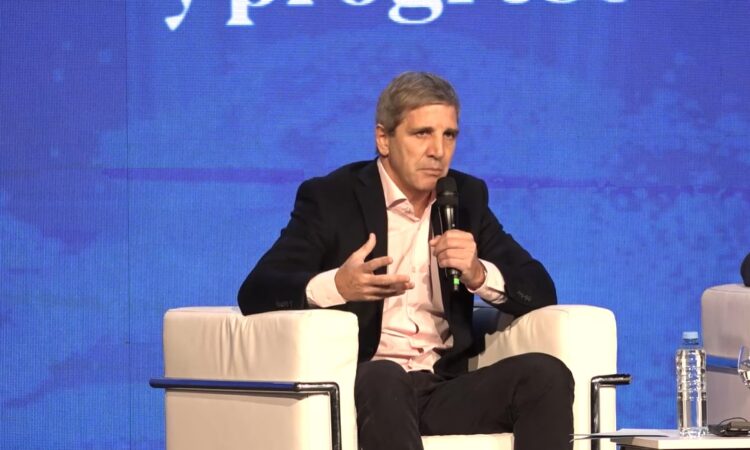
Economy Minister Luis Caputo said the government would start negotiating a new program with the International Monetary Fund on Thursday, which he hopes would bring fresh funds to the country. Those funds are a condition to lift Argentina’s international exchange restrictions, the minister added.
“We are in the process of the Fund’s [program] review, which will take place on the 13th and from then on we will start negotiating a new program with them,” Caputo said on Tuesday during the opening speech of the The Rebirth of Liberty in Argentina and Beyond conference, organized by the U.S. libertarian think tank CATO Institute.
The Fund is scheduled to review Argentina’s performance on Thursday, a routine assessment countries that take loans out with the IMF are subject to. This would be Argentina’s eighth review under the current program and, if approved by the lender’s executive board, the country would receive a US$800 million disbursement.
The minister added that his team has had a proposal for a new deal with the Fund since August 2023. Caputo’s now-defunct consulting firm, Anker Latinoamérica, suggested in May 2023 that the IMF could partly finance a dollarization program with a “contribution of fresh funds for between US$10 and US$ 15 billion.” In March, President Javier Milei hinted in radio interviews that a new US$15-billion loan from the Fund, which the government would use to lift the cepo, was in the works.
“We are not announcing [the new deal] now because logically we first have to agree with the Fund and eventually try to get new money with this new program,” Caputo added.
Argentina has stringent exchange controls collectively known as cepo (Spanish for clamp) that forbid citizens, investors, and companies from freely buying or taking U.S. dollars out of the country. The restrictions were imposed in 2019 by then-President Mauricio Macri amid a currency run, and reinforced over Alberto Fernández’s presidency due to a shortage of international reserves. In a report published on Friday, consultancy Ecolatina put net international reserves at US$500 million. When Milei took office, they were negative US$11.5 billion.
Caputo said that to eliminate the cepo there must be a “reasonable ratio between the Central Bank’s international reserves and its interest-bearing liabilities,” although he said the government would say what that ratio should be “when the time comes.”
The Fund returned as a key player in the country’s economy when Macri signed a record-high loan of US$44 billion in 2018 with the lender. The debt was renegotiated under Fernández’s administration, agreeing to an Extended Fund Facility program. This includes a comprehensive economic program that Argentina must comply with to receive disbursements every three months, which the government uses to pay the previous debt.
The lender has supported the harsh austerity measures Milei has implemented since he took office, but has said that the government should “build social and political support for the program.”
Caputo said if Milei’s controversial Ley Bases bill passes on Wednesday that would be “very good” since it would accelerate the “recovery of the economic situation.” He claimed, however, that the country would recover “just the same.”
“All the opposition knows that this bill favors Argentines, and that is the reason why a great deal of the opposition does not want to vote for it,” the minister said.
